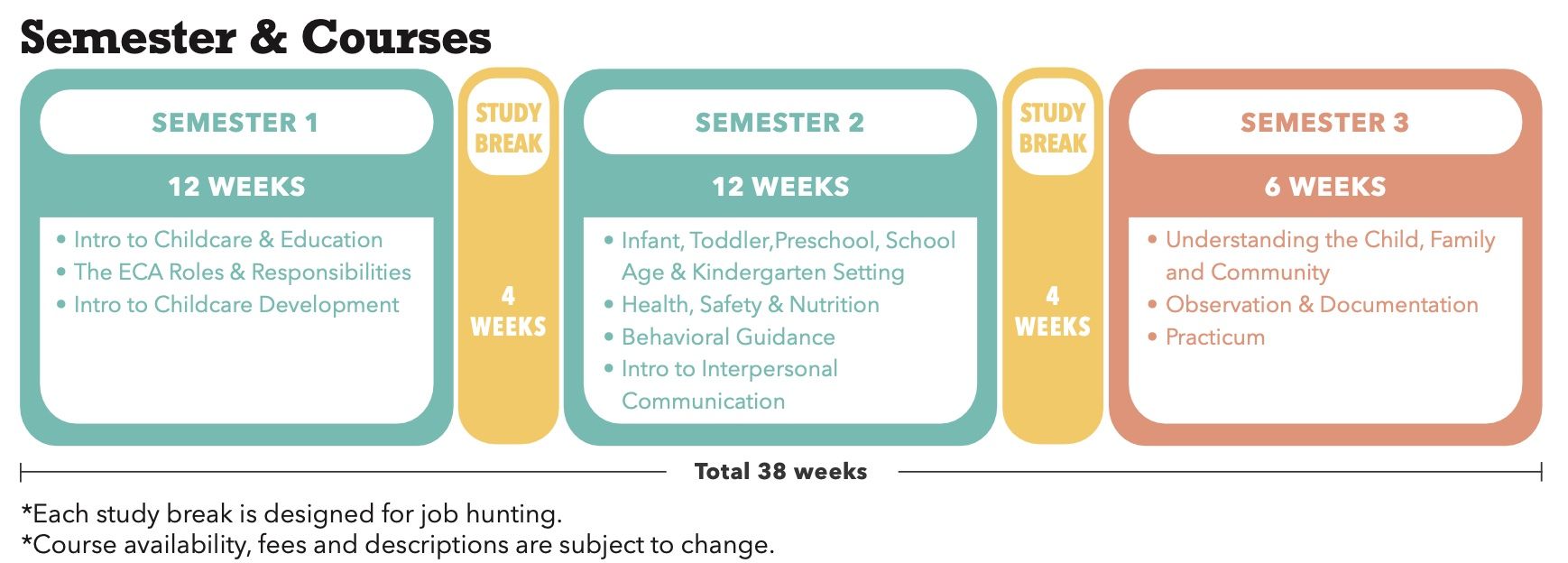The Early Childhood Assistant Program is designed to equip students with all the necessary skills to become successful educators and leaders in the ECE field. Students will learn how to support the holistic development of children in a variety of environments. Students will learn about every developmental milestone of infants, toddler, preschoolers, and school-aged students.
- Program Highlights
- Learning Outcomes
- Program Info
- Coop Placement Service
- Semesters & Courses
- Timetable
- Course Descriptions
- Career Opportunities
- Textbooks
Acquire a solid foundation in Early Childhood Education and how to support the holistic development of children in a variety of inclusive environments.
Throughout the program, students will learn about the physical, cognitive, social, and emotional development of infants, toddlers, preschoolers, and school-aged children.
Pertinent Early Childhood skills to meet the demands of today’s Childcare Centre environment
The program structure provides experiential learning for the students as they apply the theory learned in class in their field placements.
Focus on English communication throughout program
Paid/Unpaid Field Placement
Partners for field placements in various daycare center settings.
ECA Roles and Responsibilities
Child Care and Education
Child Development
Interpersonal Communication
Behavioral Guidance
Workplace Fundamentals
Toronto Campus
Credential Upon Graduation
Ontario College Diploma
Admission Requirements
- Completion of UMC ESL Level 11 or IELTS 5.0
- Wonderlic -17
- High School Diploma evaluated by WES / PLAR
Start Date
2024: January 2nd, April 22nd, July 15th, October 7th
Program Options
Early Childhood Assistant Diploma
- Academic Study: 30 weeks (Total 791 hours)
- Total Length: 38 weeks (Includes Study Break)
Students that successfully complete all required program materials will benefit from a paid/unpaid field placement for practical experience. Although the school will provide you with such a placement, we encourage students to assist in identifying placement opportunities in fields or locations of specific interest. Students may need to participate in field placements that are within a reasonable distance to the College. Travel costs are the responsibility of the student. The College has partnered with several businesses throughout the Great Toronto Area to have a variety of settings available for our students to complete their placements.
Resume Clinics
Mock Job Interviews
Canadian Workplace Culture
Career Development Workshop
Networking Events & Job Fairs
Ongoing Placement Support


Introduction to Child Care and Education
The Early Childhood Assistant Roles and Responsibilities
Introduction to Child Development
Infant and Toddler Setting
Pre-school Setting
Field Placement/Practicum
School-Age and Kindergarten Setting
Health, Safety and Nutrition
Behavioral Guidance
Introduction to Interpersonal Communication
Understanding Families and Communities
This course introduces strategies that will help students work collaboratively with families and communities. The course focuses on building effective partnerships among educators, families and communities within early learning and care programs. Students will be encouraged to use a strength-based approach to analyze their own communities and find effective ways to build partnerships with families in the early learning settings.
Introduction to Interpersonal Communication
Observation and Documentation
-
Early Childhood Assistant ($19/per hour)
-
Early Childhood Educator ($21/per hour)
-
Technology-at Your Service (McGraw Hill- ISBN: 13: 9780073516875)
-
Mavis Beacon Teaches Typing
-
Professional Approach 2007 WORD Lessons 1-19
-
Microsoft Excel 2007 Professional Approach Lessons 1-17 (McGraw Hill- ISBN:13: 978-0073519210)
-
Microsoft PowerPoint Quick Steps Lessons 1-10 (McGraw Hill- ISBN: 10 : 0072263709)
-
SuperService: Seven Keys to Delivering Great Customer Service Lessons 1-17 (McGraw Hill-ISBN: 978-0-07-162769-6)
-
College English and Business Communications: Tenth Edition Chapters 1-11 (McGraw Hill Higher Education- ISBN-10 : 0073397121)
-
Student Activity Book to accompany College English and Business Communications
-
College English and Business (Mcgraw Hill Higher Education- ISBN: 10 : 1260287130)
-
Communications: Tenth Edition Chapters 12-20 (McGraw Hill Higher Education- ISBN-10 : 0073397121)
-
Student Activity Book to accompany College English and Business Communications (Mcgraw Hill Higher Education- ISBN:
10 : 1260287130)
-
Financial and Managerial Accounting: The Basis for Business Decisions, 17th Edition Chapters 1-5 + Comprehensive (Mcgraw Hill Higher Education)
Your Future Starts Now
Take the next step to plan your future!
Upper Madison College – Designated Learning Institution Number (DLI #) O19529728922
